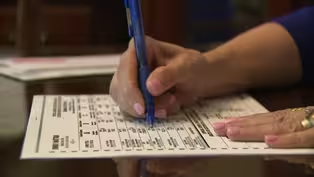NJ Spotlight News
NJEA head: Eliminating skills test can help recruit teachers
Clip: 11/28/2023 | 6m 16sVideo has Closed Captions
Interview: Sean Spiller, president of the New Jersey Education Association
Gov. Phil Murphy on Monday signed into law the elimination of the Praxis Basic Skills test as a certification requirement for new teachers, saying the move would help boost teacher recruitment and ease the staffing shortages in many Garden State classrooms. Sean Spiller, president of the New Jersey Education Association, spoke about the change.
Problems playing video? | Closed Captioning Feedback
Problems playing video? | Closed Captioning Feedback
NJ Spotlight News is a local public television program presented by THIRTEEN PBS
NJ Spotlight News
NJEA head: Eliminating skills test can help recruit teachers
Clip: 11/28/2023 | 6m 16sVideo has Closed Captions
Gov. Phil Murphy on Monday signed into law the elimination of the Praxis Basic Skills test as a certification requirement for new teachers, saying the move would help boost teacher recruitment and ease the staffing shortages in many Garden State classrooms. Sean Spiller, president of the New Jersey Education Association, spoke about the change.
Problems playing video? | Closed Captioning Feedback
How to Watch NJ Spotlight News
NJ Spotlight News is available to stream on pbs.org and the free PBS App, available on iPhone, Apple TV, Android TV, Android smartphones, Amazon Fire TV, Amazon Fire Tablet, Roku, Samsung Smart TV, and Vizio.
Providing Support for PBS.org
Learn Moreabout PBS online sponsorshipThe teacher shortage in New Jersey has increasingly worsened over the years, exacerbated by the pandemic and culture wars that have infiltrated classrooms.
But education experts say it's actually New Jersey's teaching requirements that prevent aspiring teachers from ever making it into the classroom.
Well, just yesterday, Governor Murphy signed a bill that would eliminate one of the tests critics say was arbitrary and unnecessary.
The NJEA is applauding that move.
And I'm joined now by its president and NJ PBS Community Advisory Board member Sean Spiller to explain why.
Sean, great to have you with us tonight.
New Jersey is known for its high quality standards and education, and that really begins with the quality of our teachers.
So why is the state's largest teachers union in support of getting rid of this practice basic skills test that aspiring teachers have to pass in order to become a teacher?
Yeah, listen, we're really excited to have the best schools in the nation we have for some time.
We continually do, because as you know of educators and so many others who are part of that system, but we also know that we've got to eliminate barriers for people coming into the profession.
And unfortunately, whether it's financial or otherwise, we see barriers sometimes that do not help us just recruit the best and retain the best, but really keep people out who would be great educators.
And this is an example of that.
Every educator still has to pass a subject specific test that goes through exactly what they need to know for the course that they're going to teach.
And the basic skills I used in air quotes is doesn't really measure the things that someone would think maybe are basic skills that everyone needs to know.
You know, it's pretty abstract and obscure, and it doesn't have any measure of how successful an educator will be.
So we're excited again to see getting rid of a barrier.
And I think that's always the dynamic that you're working through is how do you eliminate barriers that keep people out?
You want people to get in, but you, of course, also want to maintain high standards.
But we think we found the the right spot on this one.
Sean, just want to drill down into the history of this test a bit more.
We've sat through many education hearings where advocates called for the removal of this test.
What?
Give me an example of why this test doesn't accurately indicate the success a teacher might have in the classroom.
Yeah.
So let's say you're asking about obscure, high level math.
You know, for someone who's going to be teaching a kindergarten class, right?
So you would think of something as a basic skills test.
You know, you've got basic math on there or you've got, you know, basic writing and reading skills.
You know, those things that I guess I would think of or I think most people think of as basic when it's asking about, you know, very high level, very obscure things that you're like, well, if I'm going on to teach math, I've got a specific math practice.
I'm going to pass to go teach that course.
So, you know, again, we've got to find things that, you know, set the baselines we want, make sure we've got called educators in the profession, which we do.
That's why we've got the best schools in nation.
But we also have to be very mindful when we talk about the educator shortages that we're facing and barriers keeping people out.
US specifically a diverse workforce that we want to have come in.
We've got to look at every single thing and see which things work in which things are just being obstacles.
Yeah, that's exactly my next question to you.
How does this change potential we bring in more teachers of color.
We know that New Jersey's classrooms very often do not represent the diversity that our classrooms do.
How do we potentially see more teachers of color, especially in urban areas with this change?
Yeah, I think it's a combination of things.
I don't think is any one thing that's going to, you know, make a massive change when we're in one of the most diverse states and our diversity is our strength.
We also know one of the most segregated states.
I'll note that as well.
But as we try to recruit and retain, we've also been working with the Department of Ed and other partners to say while we're doing that, how can we get a more diverse workforce that is reflective of the student population that they teach?
And that does mean talk about eliminating some of the things that are barriers and those barriers might mean tests that keep people out because of some of the obscure things that they ask.
But it also can be the dollars, right?
So many times right now we see these high cost tests that people have to take, sometimes multiple times, while at the same time, by the way, they're trying to, you know, go into student teaching, which you can thank Governor Murphy now, make a little bit of money for now.
But you didn't get any money for you know, all of these things compounding to say, wait a minute, I've got to put out all these dollars to try and get into a profession where for somebody with the same degrees as me, they're going into something else.
They're making a lot more money and they don't have all these obstacles that I have got to get through.
So, you know, we've been, you know, very focused on saying, how do you put all these things together?
Thankful for some of the things the governor did put in the budget there to kind of alleviate some of those costs.
And this is an example of that, too, eliminating a barrier that's not only one for for content that was irrelevant, but also cost as well.
Sean, what else would the NJEA like to see changed when it comes to either the standards that are required or incentives for more teachers to get into the classrooms?
Yeah, I think you have two things, but I want to highlight another one as well.
A lot of those things focus on recruitment and that's important, right?
We've got to get people into the profession and we want to get a diverse workforce as we do it.
But we've really got to focus on retention.
What we're seeing in the data is that educators are not staying until retirement, which they traditionally did in the past.
So, yes, we've got to do the recruitment things like what the governor has done, right?
Let's start giving a stipend for student teaching.
Let's eliminate the fees that to process your paperwork.
Let's eliminate things like the Praxis test here, let's get rid of these things are happening, and that's a great start.
But these individuals are not going to stay in the profession when, again, their salaries are lagging behind their peers.
When you're facing a new dynamic, when so many other job areas can work from home, when you're looking out there and you see the burdensome paperwork that you don't think has any impact on student success, but you have to do and combine that with the loss of autonomy that educators are seeing as professionals and the erosion of benefits thankfully, we've seen some success on the health care side, but pensions have still been eroded over the years.
So we've got to do more on the retention side.
Some of those are no cost items.
Like I said, get rid of some of this paperwork that always just keeps being added and added and added.
But also, let's talk about compensation.
Say, all right, you're not compensated as much as your peers but let's revisit something like a pension system and say let's make it something that's worth it for you to stay in the profession.
None of those, by the way, are easy suggestions or easy things to change.
But Sean Spiller, thanks so much for taking the time and being with us tonight, president of the New Jersey Education Association.
Thank you.
Thank you for having me.
Dredging, beach replenishment continues in Monmouth County
Video has Closed Captions
Clip: 11/28/2023 | 3m 41s | Work has been needed with increasing frequency with the effects of climate change (3m 41s)
Gov. Murphy says CBT surcharge will sunset
Video has Closed Captions
Clip: 11/28/2023 | 4m 16s | Latest NJBIA survey showed 69% of employers rated the state economy as fair or poor (4m 16s)
'Party lines' an unfair advantage on ballots, new report
Video has Closed Captions
Clip: 11/28/2023 | 5m 18s | Rutgers report examines how primary ballots with “county lines” affect election outcomes (5m 18s)
Rutgers professor: Ceasefire holds as hostages are released
Video has Closed Captions
Clip: 11/28/2023 | 4m 7s | Interview: Michael Boyle, associate professor of political science (4m 7s)
Providing Support for PBS.org
Learn Moreabout PBS online sponsorship
- News and Public Affairs

Top journalists deliver compelling original analysis of the hour's headlines.

- News and Public Affairs

FRONTLINE is investigative journalism that questions, explains and changes our world.












Support for PBS provided by:
NJ Spotlight News is a local public television program presented by THIRTEEN PBS



